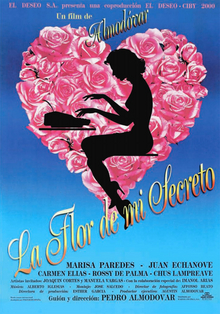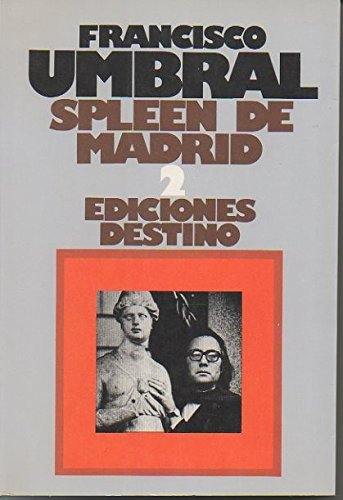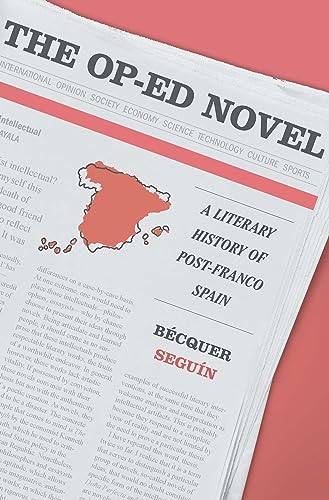 Early in Pedro Almodóvar’s 1995 film, La flor de mi secreto (The Flower of My Secret), we see a writer and editor meet inside the printing room at the El País headquarters in Madrid. “I would like to write about literature for your paper,” the writer says. This is the first time the two have met, having been connected through a mutual friend. As the conversation moves from the printing floor to the editorial offices, the gap between the writer’s ambitions and reality widens. “I don’t want this job as a favor to my friend,” she explains. “I actually want to earn it, but I haven’t published anything. I just have a draft of a novel and two essays,” handing the editor a hefty stack of printouts. Within a matter of scenes, the editor gives the writer a job as a books columnist for the newspaper’s weekend literary supplement. Her first assignment is to review the latest short story collection from a famous author of romance novels, which she gets in part as a result of her open contempt for the novelist. The editor, who is a fan of the novelist, assigns himself a positive review of the same collection, which will appear alongside her negative review.
Early in Pedro Almodóvar’s 1995 film, La flor de mi secreto (The Flower of My Secret), we see a writer and editor meet inside the printing room at the El País headquarters in Madrid. “I would like to write about literature for your paper,” the writer says. This is the first time the two have met, having been connected through a mutual friend. As the conversation moves from the printing floor to the editorial offices, the gap between the writer’s ambitions and reality widens. “I don’t want this job as a favor to my friend,” she explains. “I actually want to earn it, but I haven’t published anything. I just have a draft of a novel and two essays,” handing the editor a hefty stack of printouts. Within a matter of scenes, the editor gives the writer a job as a books columnist for the newspaper’s weekend literary supplement. Her first assignment is to review the latest short story collection from a famous author of romance novels, which she gets in part as a result of her open contempt for the novelist. The editor, who is a fan of the novelist, assigns himself a positive review of the same collection, which will appear alongside her negative review.
Soon comes the twist: the amateur writer who landed the gig as a columnist is, in fact, the pseudonymous romance author whose book she is supposed to review. The twist throws into relief the film’s many ironic criticisms of newspaper columns and novelist intellectuals. In 1990s Spain, the film seems to argue, newspaper columns are a dime a dozen. Any amateur writer with a personal connection to an editor can land one. Moreover, columns in the Sunday pages function as cultural gatekeepers, allowing a high-minded newspaper like El País to decide which artifacts of popular culture deserve a stamp of approval. Not only that: nepotism is rampant in the clubby world of newspapers. So rampant, in fact, that writers are even allowed to review their own books! And, to cap it all off, shady editorial decisions often hide behind an outward appearance of balance, where each side of an issue receives equal column space—literally, in the case of the short story collection, which will receive exactly one positive and one negative review. Once one sees how the sausage is made, such balance, the film underscores, looks more and more like a charade.
A decade later, Almodóvar’s criticisms of newspaper opinion columns would seem prescient. In a 2005 column at El País, the very newspaper Almodóvar was satirizing, the writer Elvira Lindo diagnosed—and, as an op-ed columnist, self-diagnosed—a condition that increasingly afflicted the Spanish public sphere: “opinionism.” Every morning, she wrote, thousands of professional opinion-makers go to work knowing “that they have to come with a well-formed opinion… that they must defend it vehemently… [and] that they must draw blood from those who don’t think the same way.” Whether these opinionators actually had any expertise, knowledge, or worthwhile opinions on the topics of the day, she noted, was beside the point. They were required to have opinions all the same, whether that pressure came from a public sphere in which not having a forceful opinion was “interpreted as not wanting to take sides or just being an idiot,” or from the desire to keep one of the precious few jobs in the opinion-making industry.
Fast-forward a decade and opinion-making appeared to have undergone democratization. In a 2018 editorial, the American literary magazine n+1 diagnosed “the generalization of the op-ed form across the internet.” “Everything is an op-ed now,” the editors argued. For every columnist at a highly visible outlet like the New York Times, there is an entire “reserve army of op-ed labor waiting in the wings.” Social media in particular, they wrote, “has helped turn the internet into an engine for producing op-eds, for turning writers into op-ed writers, and for turning readers into people on the hunt for an op-ed.” The twenty-first century, it seemed, had conditioned journalists and writers to produce opinion columns on demand. To become an intellectual one no longer needed one of the precious few columnist jobs at a major newspaper or website. But one still likely needed an opinion column.
 “The opinion column is the sonnet of journalism.” No line connecting literature and journalism has become quite so iconic in Spain. Its author, Francisco Umbral, perhaps the country’s most influential columnist since the transition to democracy, first made the comparison in the early 1980s, in the introduction to Spleen de Madrid 2 (1982), a collection of Baudelaire-inspired columns on the countercultural scene in the Spanish capital. The phrase has since become a literary-journalistic refrain, with much energy spent attempting to peel back its layers of meaning. Many commentators have taken this phrase to refer to the column’s literary qualities. Like Baudelaire’s prose poetry, Umbral’s opinion columns are said to innovate aesthetically by compressing meaning and observation into a limited prose structure. For me, however, the oft-quoted phrase most importantly draws our attention to the genre’s staying power.
“The opinion column is the sonnet of journalism.” No line connecting literature and journalism has become quite so iconic in Spain. Its author, Francisco Umbral, perhaps the country’s most influential columnist since the transition to democracy, first made the comparison in the early 1980s, in the introduction to Spleen de Madrid 2 (1982), a collection of Baudelaire-inspired columns on the countercultural scene in the Spanish capital. The phrase has since become a literary-journalistic refrain, with much energy spent attempting to peel back its layers of meaning. Many commentators have taken this phrase to refer to the column’s literary qualities. Like Baudelaire’s prose poetry, Umbral’s opinion columns are said to innovate aesthetically by compressing meaning and observation into a limited prose structure. For me, however, the oft-quoted phrase most importantly draws our attention to the genre’s staying power.
The op-ed’s durability as a genre of opinion writing is indeed puzzling. Despite fears that an array of new shortform writing on the internet would spell an end to the op-ed, the opposite seems to have happened. Blog posts and Twitter threads have morphed into “think pieces,” each of which argues its own “hot take” on current affairs. Make no mistake: this is the language of opinion journalism, dressed-up for twenty-first century internet culture. If forms of internet writing had become as universal and generalized as many had assumed, there would be no need to convert their arguments into an op-ed form. But op-eds are still the universal medium of opinion writing. The genre’s capaciousness to translate ideas that were initially published on Twitter or Facebook, delivered as TED talks or academic lectures, or written for peer-reviewed publications or personal diaries, even today, remains unparalleled. Although the New York Times decided to retire its use of the term “op-ed” in 2021, some five decades after popularizing it, the form of opinion journalism the term came to represent will very likely endure for decades to come.
 After a year of writing opinion columns, Elena Ferrante had one regret. “I left out only one feeling among those that interest me,” she admitted to readers in her final column for The Guardian’s weekend magazine. That feeling, she said, was “inequality.” The admission was strange. Her four-novel Neapolitan Quartet, which catapulted the pseudonymous Italian novelist to worldwide fame, had narrated overlapping stories of economic, sexual, and social inequality through the half-century-long friendship of two women in postwar Naples. In fact, inequality had been a foundational theme of much of Ferrante’s fiction up to that point. But in her opinion writing, she said, it had become secondary. “Even if I never have this experience again,” she wrote of having an opinion column, “it was very useful to me.”
After a year of writing opinion columns, Elena Ferrante had one regret. “I left out only one feeling among those that interest me,” she admitted to readers in her final column for The Guardian’s weekend magazine. That feeling, she said, was “inequality.” The admission was strange. Her four-novel Neapolitan Quartet, which catapulted the pseudonymous Italian novelist to worldwide fame, had narrated overlapping stories of economic, sexual, and social inequality through the half-century-long friendship of two women in postwar Naples. In fact, inequality had been a foundational theme of much of Ferrante’s fiction up to that point. But in her opinion writing, she said, it had become secondary. “Even if I never have this experience again,” she wrote of having an opinion column, “it was very useful to me.”
 In recent years, novelist opinion-writers from Mario Vargas Llosa in Peru to the late Javier Marías in Spain have seldom shown such awareness of their own failures. Perhaps this has to do with the growing economic and social distance between themselves and their readers. Perhaps it has to do with the comforts that come with spending decades working for the same newspaper. Or perhaps it is because they can no longer imagine a new kind of public, one that might be brought into being through novels and op-eds. With the further democratization of intellectual life will come new readers. Will our novelist intellectuals of the future be courageous enough to reimagine that new public? If they are, we will likely notice it on the op-ed page.
In recent years, novelist opinion-writers from Mario Vargas Llosa in Peru to the late Javier Marías in Spain have seldom shown such awareness of their own failures. Perhaps this has to do with the growing economic and social distance between themselves and their readers. Perhaps it has to do with the comforts that come with spending decades working for the same newspaper. Or perhaps it is because they can no longer imagine a new kind of public, one that might be brought into being through novels and op-eds. With the further democratization of intellectual life will come new readers. Will our novelist intellectuals of the future be courageous enough to reimagine that new public? If they are, we will likely notice it on the op-ed page.
Excerpted from The Op-Ed Novel: A Literary History of Post-Franco Spain by Bécquer Seguín, published by Harvard University Press.












